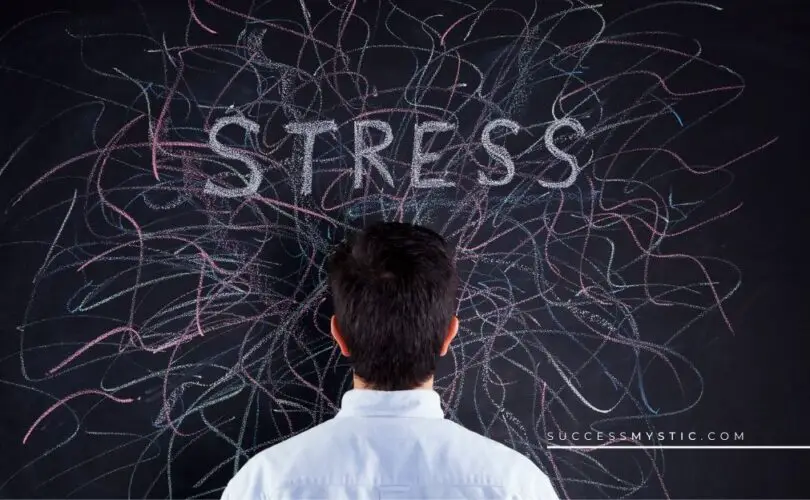Stress affects millions of Americans. According to the Statistic Brain Research Institute, 77% of Americans report experiencing physical symptoms associated with stress. 1/3 of Americans feel as if they are living with extreme stress.
While stress levels have been trending downward over the eight years since the American Psychological Association began its annual survey, the stress related health and wellness gaps among Americans remain alarming.
Men are more vulnerable to the effects of stress than women are.
While both sexes experience stress and men report being less stressed than women are, women appear to handle stressors better than men do. The reasons for this are both physiological and social.
Stress is a fact of life. In many ways, stress can act as a beneficial motivator to accomplish a task or a goal. However, the perception of stress plays a key role in how harmful or beneficial it is to a person. In many cases, the career or work related stress and social pressures experienced by men when considered along with men’s poor relationship to stress management creates a cycle of poor and degenerating health over time.
What Is Stress
Stress is a physical and mental state resulting from a person’s experience of environmental stimuli. Scientists refer to these environmental stimuli as stressors. Environmental stimuli allow human beings to live productive lives and to do so avoiding injury. Sights, sounds, and interactions with objects, animals and other people provide the feedback needed to make appropriate choices. When the feedback becomes extreme or excessive, it shifts from being categorized as a source of stimuli to causing stress.
In modern vernacular, stress refers to stimuli which, triggers the fight or flight response. The fight or flight response activates the sympathetic nervous system when a the body and brain perceive a threat. During this response adrenaline levels rise, the heart rate elevates, muscles tense and the breathing pattern accelerates in preparation to flee or defend against the perceived threat.
In the past, threats were more clearly defined. Physical jeopardy from another person or animal, prolonged hunger or exposure and other challenges facing human ancestors caused the fight or flight response to become a standard human survival mechanism. Unfortunately, the circumstances, which provoke the fight or flight response in modern people tend to be less concrete and more prolonged. The stressors have evolved, but our ability to respond appropriately has not. When we experience anxiety and stress related to performance pressures at work or difficult relationships at home, the body has not learned to downgrade its response. The response still occurs as if life or death are the stakes during stressful interactions.
For clarity, stress does not always negatively affect the person experiencing it. Stress heightens awareness, sharpens the senses, and increases focus. Pleasurable stressors make a happy experience more enjoyable. For example, a game of Frisbee or a long run stresses the body and the nervous system, but the stress brings about enjoyable effects. The person engaged in these activities has fun, releases endorphins, which enhance a person’s sense of well-being and experience a higher level of relaxation after the experience.
The inability of the body to gage threat levels effectively modern settings leads to a host of physical and psychological issues. Prolonged or chronic stress leads to physical and mental health problems. It also negatively affects professional and personal relationships. Stress makes living a fulfilling and healthy life very challenging.
Common Sources Of Stress For Men
Stressors can be positive or negative; any circumstance which forces you to push yourself or adapt quickly to an unexpected situation causes stress. Some people handle stress more effectively than others do. Circumstances, which cause one person to “stress out,” will not seem nearly as significant to another person. Despite this potential range of responses to extreme stimuli, common sources of stress affect a broad spectrum of people.
Internal and external factors cause stress. Internal stress factors come from a person’s own desires and expectations.
A man with a highly competitive nature can experience stress related to pressure he places on himself to perform well; he may also spend more time being critical of their performance by creating a negative inner dialogue.
Men also experience external stress factors related to their environment. For example, working long hours while not eating and sleeping adequately for extended periods of time stress the body.
Common sources of internal stress include:
- Negative critical inner dialogue
- Unrealistic expectations/Perfectionism
- Binary Mindset (All or nothing outlook)
- Pessimism
- Inflexible attitude
- Persistent worry
Common sources of external stress include:
- Financial difficulties
- Major life events
- Work or school
- Relationship issues
- Overscheduling
- Children and family
The key to whether or not a person experiences common stressors as positive or negative depends on their perception of events and their individual temperament. A crowded musical venue can energize and excite one person while another finds it draining and taxing. One person may view a series of mishaps with humor while another becomes stressed and unfocused, unable to address the problems they cause.
How Stress Affects A Man’s Life
According to the American Psychological Association, women are more likely to report themselves as experiencing high levels of stress. Women also experience greater increases in stress over time than their male counterparts. Women cite money problems and the economy as a significant source of stress more frequently than men do. However, men report work as a more significant stressor than women do. Women also report the physical and emotional symptoms of stress more often than men do. In short, it appears that stress affects women more often than it affects men.
These findings may be somewhat misleading. Women report higher levels of stress and more ongoing stress, but men seem to experience greater impacts on their life. A Canadian study of 24,000 adult workers showed both men and women as being vulnerable to work related anxiety and depression. It also found men are more likely to experience major depression related to workplace than women are. Men also experience greater negative health impacts related to stress than women.
Chronic stress negatively affects men’s quality of life. The negative physical and emotional impacts of stress change cause a cascade of issues, which affect every aspect of a person’s life.
Men who experience chronic stress are more likely to:
- Develop chronic degenerative health conditions
- Drink alcohol
- Report problems with their relationships
- Exhibit higher levels of vulnerability to anxiety, major depression and suicide
The Burdens Of Stress
Physical, mental, and emotional symptoms accompany chronic stress. When experienced individually and short term, the effects of fight or flight response, elevated secretion of stress hormones, rapid breathing and heart rate, increased sensory perception and tense muscles, simply do their job, assisting your efforts to address an imminent threat. These when prolonged or repeated frequently within short time frames create degenerative conditions and illness.
Stress affects a person’s mental, physical, and emotional well-being. There are signs and symptoms, which indicate stress as the source of various health and wellness issues. Chronic stress also causes changes in behavior.
Physical Symptoms
- General aches and pains
- Frequent colds
- Digestive issues (constipation, diarrhea or nausea)
- Dizziness
- Chest pain, elevated heartbeat
- Decreased or absent libido
Mental Symptoms
- Constant worrying
- Poor memory
- Poor decision making
- Endless worrying
- Negative perception of all experiences
- Anxiety and mental looping
- Racing thoughts
Emotional Symptoms
- Mood swings and melancholy
- Feeling irritable and easily angered
- Feeling agitated and unable to relax
- Feeling lonely and isolated
- Depression or unhappiness
- Feeling overwhelmed
Behavioral Symptoms
- Seeking seclusion
- Procrastinating or avoiding responsibilities
- Self-medicating with alcohol, cigarettes, or drugs to relax
- Nervous habits (e.g. nail biting, pacing, fidgeting)
- Significant changes in appetite
- Significant changes in sleeping patterns
Men experiencing chronic levels of stress are more likely to develop chronic illnesses. They also tend to neglect the good habits, which could protect their long-term health and develop habits to cope with stress, which negatively affect the same.
Sources of extreme stress such as the death of a loved one, job loss early or mid-career or divorce make men more likely to develop heart disease, ulcers, high blood pressure, type 2 diabetes, heart attack, severe anxiety or depression and suicidal thoughts. The way men deal with stress makes them more susceptible to developing these ailments. For example, sleep disturbances and poor eating habits as well as the overeating, which tend to accompany intermittent or missed meals, leads to obesity and its corollary illnesses. Stress also creates inflammation in the body, which makes cholesterol particles adhere to blood vessel walls; the narrowing of arterial walls leads to heart attacks and strokes. While women also experience these health issues, men fail to address them at higher rates than women do.
The Workaholic Male
Western society ties a man’s professional performance to his intrinsic value as a person. Societal expectations drive some men to work more than they should. Instead of simply maintaining a solid work ethic, these men work long hours and maintain stress levels, which can negatively affect their physical and mental health as well as their ability to maintain positive relationships.
According to Doctor Barbara Killinger, workaholics’ obsession with work leads them to become addicted to attaining power, control, and public recognition. Overtime, this focus causes the workaholic to become emotionally crippled, unable to maintain healthy personal or professional relationships. Their complete focus on their desire for power, control, and accolades keeps them stressed and eventually disconnected from others.
While workaholics initially appear to be successful, they eventually experience a decline. They operate at a high level of stress over the course of many years and eventually suffer physical and emotional repercussions. When they complete a task or reach a goal, they look for their next big accomplishment, which must eclipse the previous ones. Adrenaline and ego fuel their progress as well as their decline.
According to Dr. Killinger, workaholics exhibit the following traits:
- Hyperactive behaviors; walking, talking and performing mundane activities at faster than usual pace
- Overscheduling
- Performance anxiety
- Controlling behaviors
Workaholics can manage hectic schedules and performance anxieties while in good health.
As their conscious and subconscious stress wears on them, they exhibit these problems:
- Panic attacks
- Sleep Disturbances (nightmares, chronic insomnia)
- Depression
- Claustrophobia
People with workaholic tendencies come from backgrounds, which place a high value on performance. Love and praise are given according to performance–primarily given for performance, which exceeds demanding expectations. Others who develop this problem experienced early and serious responsibility following a major life event such as the death of a loved one, parental illness, or divorce.
Workaholics are not all the same. They present in a variety of personality types:
- Pleasers: Struggle to say no as they work to project their highly crafted positive persona
- Controllers: Desire power and control and find it difficult to maintain close non-work relationships
- Narcissistic Controllers: Driven by their agenda to the point of ethical compromise
Workaholics eventually experience a fall from grace. They break down as their Feeling function ceases to do its job. They begin to make decisions, which do not take their failing faculties into account. They also experience an erosion of ethics and integrity as their Feeling function ceases to respond. They begin to use denial, power, and control to justify and facilitate their actions when pursuing more power and control.
Making Changes
The first step to addressing workaholic behavior is for the person with the addiction to acknowledge the problem. They can then take additional steps to correct their behavior, which includes seeking professional help. These behavioral modifications recommended by Lolly Daskal, President and CEO of Lead from Within, provide an excellent starting point to change workaholic behavior.
1. Set hard start and end times for your work schedule.
2. Take breaks during the day and build in extended breaks appropriately. Use your vacation days.
3. Create a healthy work related mindset. Hard workers effectively balance their work and personal lives. Workaholics do not. Taking a break is not being lazy; it is recharging.
4. Give your efforts to reorient your work life balance serious attention. Do not treat it as an exercise.
5. Try meditation. Learn to relax and allow your mind to rest for at least 10 minutes a day.
6. Keep your work and home life separate.
7. Build and maintain healthy boundaries around your work schedule. Be intentional about picking up one more shift or another project and schedule such events according to these healthy boundaries.
How To Deal With Stress
The way men and women process stress differs, while the general reactions to stress are the same, men and women secrete varying levels of three hormones, cortisol, epinephrine, and oxytocin.
The first two hormones elevate blood pressure and blood sugar. Oxytocin, the hormone responsible for relaxing, nurturing and bonding emotions, also enters to the bloodstream to counter the other two hormones. It keeps the fight or flight response at manageable levels. Men secrete much less oxytocin than women do which partially accounts of the differences in responses.
According to Web MD, men to exhibit three distinct difference from women when responding to stress:
- The higher levels of oxytocin in women’s bloodstream lead them to exhibit tending and nurturing behaviors toward the people around them. Due to lower levels of oxytocin, men seek typical fight or flight solutions to stress. They freeze (suppressing their response and feelings), escape the source of stress, or defend against it.
- Women tend to measure their worth according to the strength of their relationships. Men tend to measure their worth according to work performance. They both suffer stress related to an inability to adequately implement self-care routines.
- Women take care of others at the expense of their health and well-being while men allow external expectations and objectives to infringe on the same.
Because men and women process stress differently, men need to pursue remedies most beneficial for them.
While everyone must eventually process their feelings, the first step for most men is not seeking out the counsel of a few friends and working through the issues, as women tend to do.
In many instances, men seek out alternative activities, which allow them to escape the problem for a bit while indulging in some friendly, pressure free competition.
Time with the guys doing things like bowling, playing golf or a quick pickup game of basketball allows men to destress while meeting some of their baseline psychological and physiological needs. Men need this time away in order to clear the fight or flight response, because their oxytocin levels are not high enough to counteract the response effectively.
Four Concepts To Manage Stress
1. Live in the present: Don’t expend undue energy on the past or the future. You control neither.
2. Change your perspective of stress: stress happens your approach to it makes a huge difference
3. Develop a stress management strategy and apply it consistently: meditation, exercise, journaling
In order to manage stress effectively, men must recognize their condition. They must also build strategies to manage their stress levels and counter the effects of stress.
Men who effectively manage stress also acknowledge the need for guidance — at least in the beginning to do a good job of implementing these changes and strategies.
Exercise For Stress
Exercise provides a twofold benefit when it comes to stress. Exercise increases the body’s resilience when encountering stressful stimuli; it strengthens all of the body’s systems for optimal function. It also releases positive or feel good hormones which counteract the hormones secreted during the fight or flight response.
Regular exercise produces the following benefits:
- Increased production of endorphins, the brain’s positive emotion neurotransmitter
- Improves mood by relieving the symptoms of depression and anxiety
- Improves sleep
- Lowers blood pressure
- Improves cognitive function
- Like meditation exercise can provide the mind an opportunity to rest as you concentrate on a single activity
Personality Appropriate Forms Of Exercise
In the Men’s Fitness article, The Best Workouts to Relieve Stress, writer Scott Quill recommends upping stress relief benefits by choosing a workout, which aligns with your personality. Your level of enjoyment during an exercise regimen often determines how well you stick to it.
Choosing a personality appropriate form of exercise multiplies its benefits, you’re more likely to keep it up, and the additional enjoyment you derive from it increases the quality of the workout and the level of benefits derived from it.
Quill describes the following workout personalities and workout suggestions:
1. The Aesthete: motivated by appearances and skillful execution
2. The Thrill Seeker: motivated by elements of danger and unpredictability as well as energy boost provided
3. The Social Activist: motivated by team based activities
4. The Deathophobe: motivated by the threat of imminent death or ill health if they do not exercise
5. The Fanatic: motivated by their routine and commitment to good health
6. The Energized Animal: motivated by the opportunity to dissipate extraneous energy
Each of these personality types benefit by adjusting their workouts, which suit them best. For example, an Aesthete would seek skill-based activities, like archery or golf. They may also benefit from the presence of mirrors, which allow them to see how well they are doing. At the other end of the spectrum, the Deathophobe, most likely will benefit from a low key approach to exercise, doing so for moderate time periods at a moderate level of intensity.
Traditional Exercises
These are just a few examples of traditional forms of exercise that reduce stress.
- Weight Lifting
- Biking
- High Intensity Interval Training
- TRX Training
- Crossfit
- Running
- Walking
- Boxing
- Karate
- Swimming
- Fitness Classes
- Dancing
- Bodyweight Exercises
- Circuit Training
- Kickboxing
Alternative Forms Of Exercise
Along with traditional workouts, men can use alternative forms of exercise like these to reduce stress:
- Yoga
- Tai Chi
- Pilates
- Deep Breathing And Progressive Muscle Relaxation
These forms of exercise focus on building mental resilience and a sense of well-being to relieve stress.
While the stressors experienced during these forms of exercise are mild compared to the stimuli provided by more traditional forms of exercise, they provide many of the same physiological benefits such as:
- Lower blood pressure
- Improved cognitive function
- Improved sleep
- Decreased symptoms of depression and anxiety
The Mind Body Approach
These exercises also offer a mind body approach that incorporates meditation and/or mindfulness along with physical movement that greatly improves the emotional and mental status of men with chronic or even mild stress. A Well Rounded Fitness Routine
To experience optimum stress relief, men should combine traditional forms of exercise with alternative forms of exercise. This creates a holistic approach, which specifically addresses the physical as well as the mental and emotional effects of stress.
Alternative forms of exercise to address stress also have the beneficial characteristics of requiring little to no equipment and very little space, enough for a yoga mat or a comfortable chair, to accommodate.
8 Types Of Massage
Along with enhancing circulation, improving range of movement in the joints and relaxing painful and tight muscles, massage can also help to keep your stress levels low. There are various massage therapies available so it may require a bit of trial and error to find the right technique and actual therapist that will be most effective against your stress.
There are many different types of massage and while all are beneficial in their own way, there are some such as pregnancy massage that are not aimed at nor would they suit men.
Swedish Massage
This is the type of massage you are probably most familiar with as it is one of the most popular types that people refer to when it comes to massage. It involves long and soft kneading strokes along with rhythmic and light tapping along your muscles’ top layers.
A Swedish massage can help to relieve tension in your muscles, while rejuvenating and relaxing you at the same time. Therefore, Swedish massage is one of the best, if not the best option for men trying to reduce their stress levels.
Deep Tissue Massage
As the name suggests a deep tissue massage targets specific trouble spots. A therapist performing this kind of massage will use very deliberate and slow-pressured strokes over layers of tendons, muscles and the other tissues that lie deep beneath your skin.
Though it is definitely not for the fainthearted, if you are suffering from back sprains, other muscles injuries, or chronic tension as related to stress – this is ideal.
Hot Stone Massage
Hot Stone Massage is another type of massage with a self-explanatory name. It involves a trained therapist placing gently warmed stones on specific parts of your body. The stones are left in the same position for a beneficial period of time.
If you are in pain or feeling strain in your muscles because of stress, hot stones could be very helpful because of the warmth, they generate to those critical areas to alleviate tension throughout the body.
Shiatsu Massage
Shiatsu in Japanese literally means, “finger pressure.” Therefore, a shiatsu massage involves rhythmic pressure being applied to precision points all over the body, known as acupressure points. Practitioners suggest that the acupressure points are vital to allow free flow of the Chi (the body’s energy) by relieving blockages.
Traditional Chinese Medicine believes that when the Chi is flowing freely, it restores the body to an optimal place of balance to alleviate even the most chronic stress and other ailments, as it is the key to optimal wellness.
Reflexology
Reflexology involves the use of finger, thumb, and hand techniques to stimulate 24 specific pressure points on the heels of the feet that have identified to trigger various reactions throughout the body and its organs.
Reflexology is believed to gently nudge the body to function better by improving muscle relaxation, lymphatic drainage, and circulation. It also stimulates the nerve pathways, and promotes muscle relaxation.
Pressure points in the feet linked to organs in the body that are most comprised by stress, including the bladder, sinus, adrenal glands, kidneys, brain and heart can be stimulated with a touch of a finger and men can learn to do this themselves or hire a professional reflexologist.
Reflexology is believed to therapeutically reduce stress and tension all over the body to improve blood flow and release toxins from the body’s tissues. The therapeutic touch on the pressure points of the heels of the feet releases endorphins, the body’s natural feel-good hormones that are known to reduce stress.
Reflexologists believe long-term stress is damaging to the adrenal gland, which is triggered during the “fight or flight” response seen with stress. The adrenal gland is associated with a small area beneath the ball of the foot that sits right under the big toe. Applying pressure to this area helps release blockage and bring stress relief.
Overall, reflexology promotes self-healing in the body to bring the balance necessary for good health.
Thai Massage
This massage involves the therapist using their own body to position and move you into a variety of different positions. It includes the use of acupressure, joint mobilization, and muscle compression techniques.
Trigger Point Therapy
Trigger points are tight areas inside muscle tissue that can cause other parts of your body pain. For example, a trigger point in your back could cause neck pain. Furthermore, in this situation, your neck has now become a satellite trigger point. This means that your neck could cause head pain.
The pain that results from trigger points, depending on the individual and their own unique situation, could either be a dull ache kind of pain or a very sharp and intense type of pain.
Trigger point massage therapy is designed specifically to alleviate the source of trigger point pain by using a series of isolated pressure being applied and then released. The therapist performing this will ask you to identify exactly where and how intense the pain and discomfort is. This form of massage can help you to manage stress and pain caused injuries.
Sports Massage
Although sports massage is primarily aimed at athletes, if the cause of the stress you feel is related to a sports or workout injury, this is a good option for you as sports massage targets specific areas of injury or muscle pain. It can also be used before and during sports events to improve flexibility and help with muscle strain.
Meditation
Meditation is one of the easiest and perhaps one of the most effective stress relief techniques. Just one 5 to 10 minute session can create a calm and relaxed mood that could last for the rest of the day. Meditation can be done almost anywhere and anytime; all you need is a quiet place.
Meditation is ideal for the stressed out executive, or any man who needs to needs to quickly elicit the relaxation response during work times to counteract the fight or flight response produced by stress.
Regular participation in mediation allows one to better manage
and respond to stress on a long term and ongoing basis.
The mind body connection that is offered to practitioners allows them to better deal with and perceive stressful situations than people who do not meditate, so any future and ongoing stress has much less of an impact on the individual who suffers from it.
Meditation also boosts cognitive function, attention, and focus, improves heart health, boosts mood and concentration, promotes calm and peace in the mind and emotions, boosts immunity, and has many more profound benefits for mind, body, and spirit.
Brain scans show people who meditate have more gray matter that improves brain function. Sleep is improved by mediation, which also helps stress and meditation promotes healthier aging.
Millions of people around the world use mediation every day to counteract stress, and to improve their overall health. There are many different types of meditation techniques, including imagery and visualization, and plenty of CD’s and online audio guides that take you through a specific scenario to induce relaxation.
Emotional Freedom Techniques/Tapping
EFT is another great way of handling stress. It may not be for everyone, however, when it does work it is extremely effective and is very easy to use at its most basic level.
Developed by Gary Craig, EFT involves tapping your fingers on specific meridian points that are believed to help communicate energy information around the body, while you focus intently on the emotion, or thought that you want to release.
This may be an ideal option for men who work at desks all day and need effective remedies for stressors throughout the day.
Laughter
Although laughter cannot cure all of life’s problems, it can certainly soften the blow quite a bit. Even if you force a laugh because you are too grumpy or stressed to properly enjoy something intended to be funny, it can still have beneficial effects.
When you laugh, the brain releases dopamine and other feel good mood altering hormones, which help boost mood and support “anti-stress” feelings. Therefore, it is not far-fetched to suggest that spending time with that friend from work or relative who always makes you laugh or watching your favorite comedians or comedy films will help reduce your stress. With the easy access you have to online media with smartphones and the Internet at the tip of your finger, it is easy to play a quick stress reducing comedy video on YouTube more than once throughout a stressful day to get an all-natural dose of medicine known as laughter.
Sex
Yes, men, sex. However, it is worth noting that while sex can be a great form of stress release, many women find that it inhibits sex. This is because, depending on the individual in question, passion and intimacy (things connected to sex) are significantly compromised by certain levels of stress. Therefore, it may be a case of testing the water a little.
Certainly, you can release a lot of pent-up emotions with sex and the elation you experience from an orgasm can often help alleviate stressful feelings in the moment.
A Psychology Today article titled, Activity, Sex, Laughter, and Meditation Are Stress Relief Secrets cites a new study that discovered something all college students have known for many years – sexual activity may lower stress.
GET YOUR STRESS UNDER CONTROL!
No amount of work, success or anything else in life is worth harming your health in the ways that chronic stress can.
It is possible to control stress and its harmful effects on your body to age better, prevent chronic disease, boost your immunity, and promote stable emotional mental health.







